The Intel Optane SSD 900p 480GB Review: Diving Deeper Into 3D XPoint
by Billy Tallis on December 15, 2017 12:15 PM ESTAnandTech Storage Bench - Light
Our Light storage test has relatively more sequential accesses and lower queue depths than The Destroyer or the Heavy test, and it's by far the shortest test overall. It's based largely on applications that aren't highly dependent on storage performance, so this is a test more of application launch times and file load times. This test can be seen as the sum of all the little delays in daily usage, but with the idle times trimmed to 25ms it takes less than half an hour to run. Details of the Light test can be found here. As with the ATSB Heavy test, this test is run with the drive both freshly erased and empty, and after filling the drive with sequential writes.
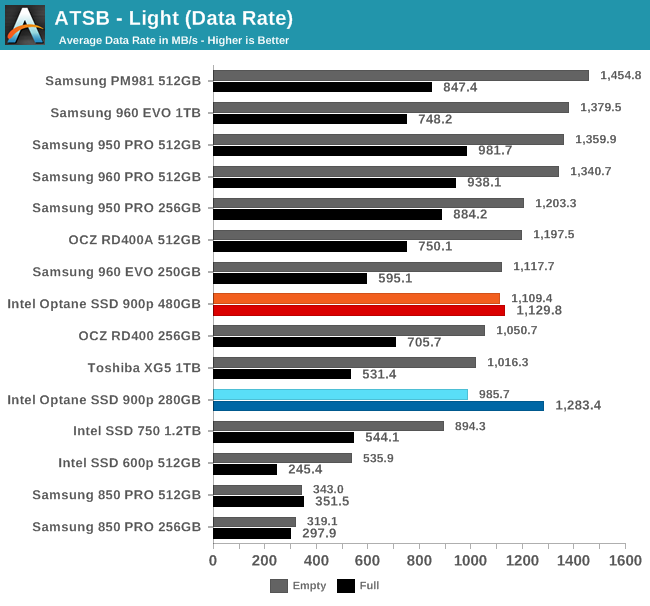
The Light test shows much greater differences between full and empty drive performance, for both flash SSDs and for the rather variable 280GB Optane SSD 900p. The 480GB model shows less variation in its average data rater between the full and empty runs. Overall, the Optane SSDs outperform a full flash-based SSD but are unimpressive compared to a fresh out of the box flash-based SSD.
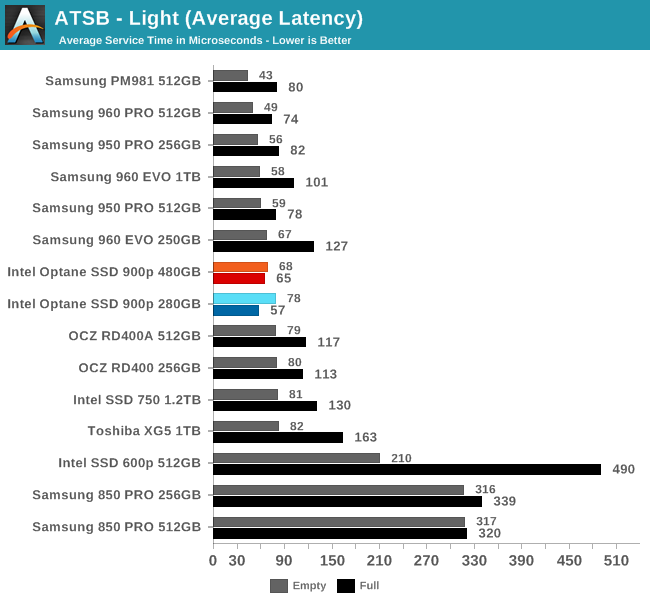
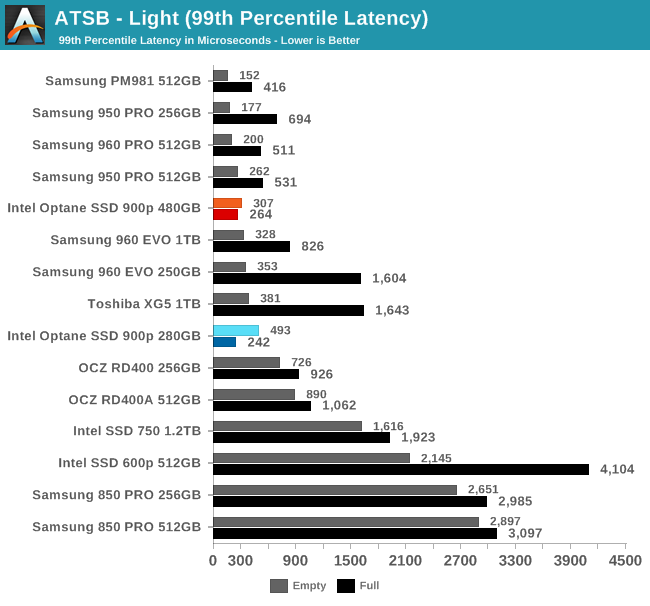
Aside from the different behavior of full vs empty, the average and 99th percentile latency scores of the Optane SSDs are not too interesting. The best-case performance is not quite as fast as the best from a flash based SSD, but once the flash drive is slowed down by being full, the Optane SSD shows a meaningful latency advantage.
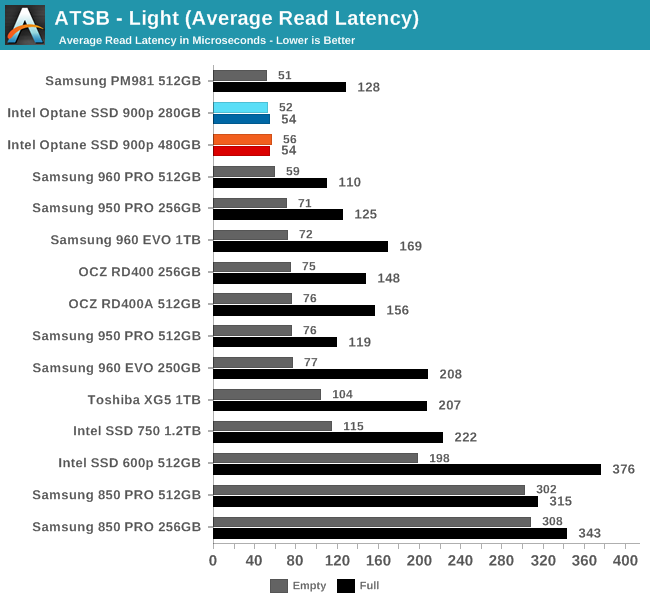
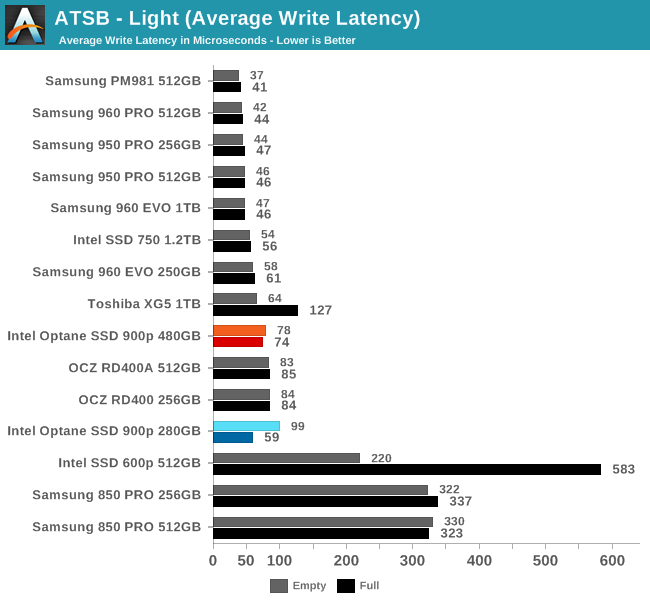
The average read latency of the Optane SSDs on the Light test is not hurt by filling the drive, giving it much better latency in the worst case scenario than any flash-based SSD. When the Light test is run on freshly-erased drives, the Optane SSD's average read latency is about the same as the best flash-based drives. Neither Optane SSD sets a record for average write latency, and Samsung's fastest NVMe drives have a clear advantage.
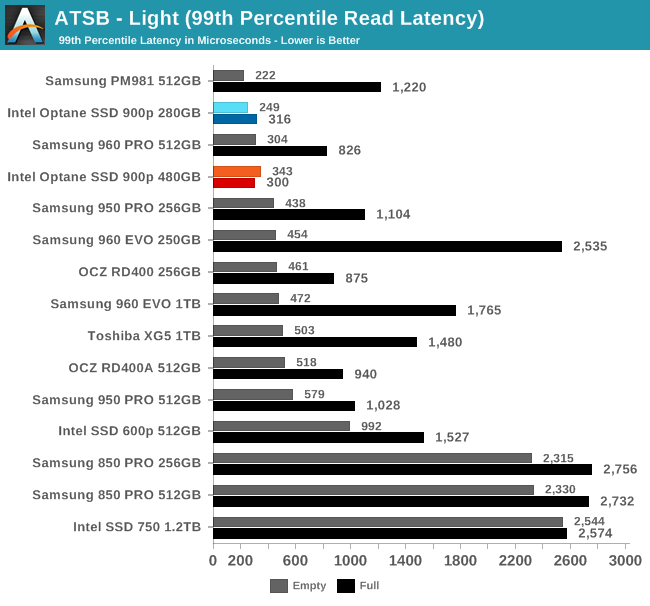
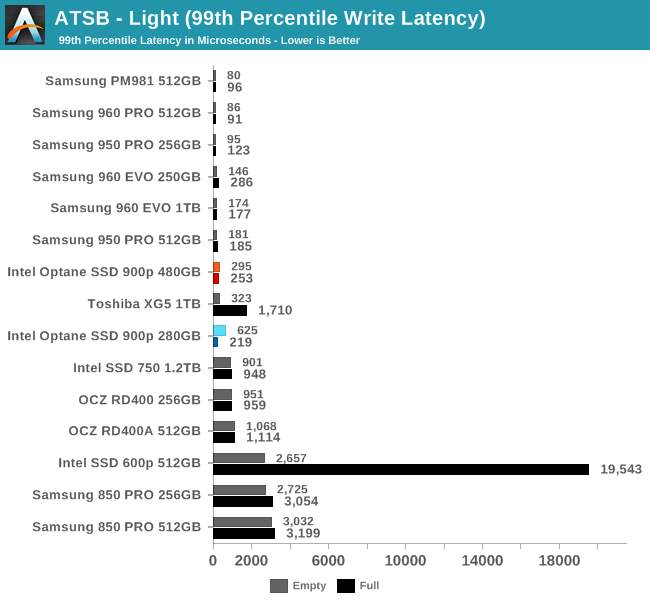
As with the average read latency, the 99th percentile read latency of the Optane SSDs on the Light test only impresses when compared to the performance of flash-based SSDs in unfavorable conditions like being completely full. Otherwise, the Samsung PM981 performs just as well, and the 960 PRO isn't far behind. The 99th percentile write latency of the Optane SSDs is clearly worse than Samsung's top NVMe SSDs.
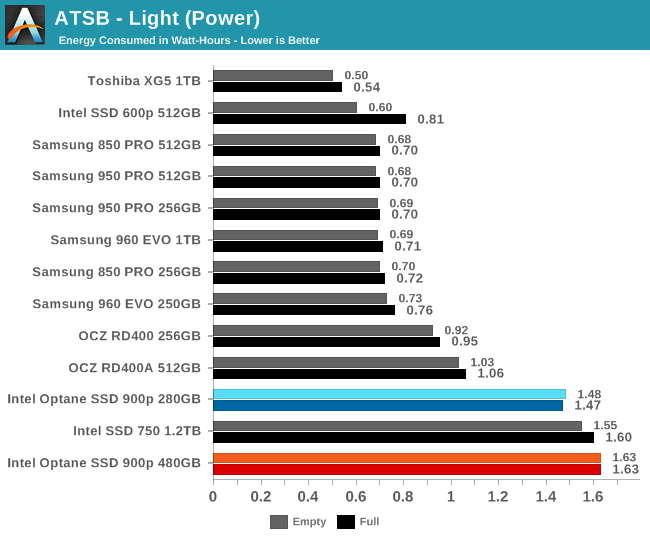
The Optane SSD 900p again requires much more energy than most NVMe SSDs, and the larger Optane drive requires significantly more power—three times as much as the most efficient NVMe SSD we've tested.










69 Comments
View All Comments
Nottheface - Monday, December 18, 2017 - link
So are the origins of xpoint memory here as claimed:"Bronek Kozicki
Silver badge
Report abuse
Holmes
one last point
There's been so much speculation about what XPoint actually is. Well, it might be Cross-Point memory, pretty well documented few years ago - here . Unity Semiductor where this research has been conducted was acquired by Rambus in 2012 and, one year later, Micron and Rambus signed agreement giving Micron access to all Rambus patents (which would include Cross-Point IP), details here. The wording used ("... granted to Micron and its subsidiaries") would also explain why XPoint venture is majority-owned by Micron."
From:
https://forums.theregister.co.uk/forum/1/2016/04/1...
Nottheface - Monday, December 18, 2017 - link
So from this:https://web.archive.org/web/20121117195338/http://...
emvonline - Tuesday, December 19, 2017 - link
NOT: XPoint is the same memory Micron and Intel were working on 10 years ago. Unity/rambus work is not at all relatedl. Side note: Intel owns the Name X point and licenses it to Micron. Intel owns the IP jointly with Micron.emvonline - Monday, December 18, 2017 - link
Real world numbers:I looked at a different website and the numbers showed large impacts on benchmarks. But if you look at actual gaming service times, boot times, or load times, Optane is faster but not noticeably faster (<10% difference). Could I easily tell the difference between this and other NVMe SSDs when gaming?
djayjp - Tuesday, December 19, 2017 - link
Nope.djayjp - Tuesday, December 19, 2017 - link
You wouldn't even be able to tell the difference between this and the budget sata SSDsemvonline - Tuesday, December 19, 2017 - link
I agree... would love to get Anandtech to agree publiclyalbert89 - Thursday, January 4, 2018 - link
Intel have given me more reasons why their optane series is nothing more then a price gouge.And non of the paid up Intel fangirls like Jays2cents, Linus Gordon from PCworld, TomsHradware etc, are going to convince me otherwise.
Chaser - Thursday, January 25, 2018 - link
Tomshardware paints a completely different picture on rather unique user experience these drives provide gamers and enthusiasts.